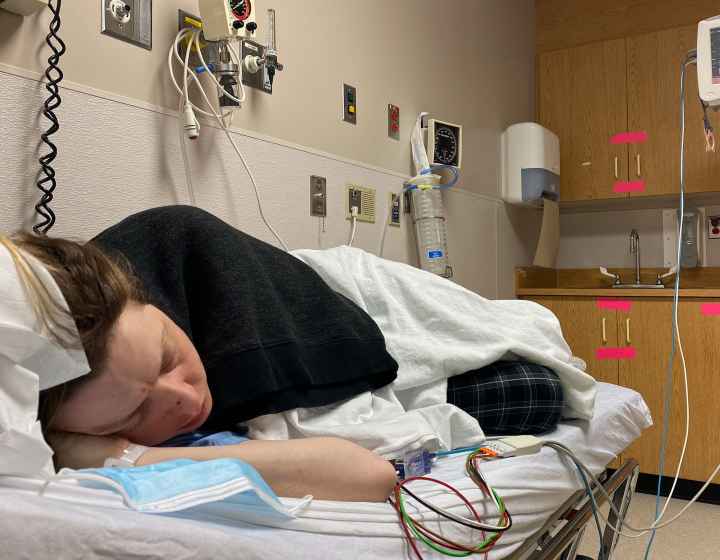Marla Marshall has been waiting for her second liver transplant since February this year — and now she’s worried that time is running out.

The Calgary mother of three daughters was born with a form of neo-natal hepatitis and had her first transplant back in 1998. That liver is now failing, too.
With COVID-19 cases surging in Alberta, hospital ICUs are overwhelmed, causing life-saving organ transplants to be pushed back for many, like Marshall.
“My symptoms get worse, my eyes get yellower, my bruising gets worse and the waiting gets longer,” said Marshall, who is in her 40s.
At this time, urgent cases involving deceased donor transplants are being prioritized, but all living donor surgeries have been postponed, a spokesperson for Alberta Health Services told Global News in an emailed statement.
As of Tuesday, there were 1,100 Albertans in hospital with COVID-19, 263 of whom were being treated in the ICU.

The situation is also concerning in Saskatchewan, which last week halted its organ donation program due to a lack of staff and intensive care beds brought on by the province’s fourth wave of COVID-19.
Saskatoon resident Jessica Bailey, who has been on kidney dialysis for the past two years, was finally given the green light by her doctor on Sept. 15 for a transplant.
Before a date could be set for her procedure, though, the province suspended all organ transplants. She was devastated.
“It’s a little disheartening to go from thinking you’re going to get your life back to now, I don’t know what’s going to happen or how long we’re going to have to wait,” the 35-year-old kidney patient said.

Get weekly health news
“The longer I go without a transplant, the higher the risk is that I’m going to die,” she added.
Experts fear the lag in life-saving procedures may result in more deaths this year.
“It’s a moment of extreme concern for all those who are waiting for a transplant,” said Nem Maksimovic, manager of national health promotion and education with the Canadian Liver Foundation.
“This may very well result in more patients dying while waiting on the transplant list.”

What is happening in Alberta and Saskatchewan also affects Canadians nationwide, Maksimovic said, because of the uncertainty of what could happen at other transplant centres across the country in the future.
The cancellations not only add to stress for patients and families who are waiting for a new organ, but also risks worsening their quality of life, he warned.
The pandemic has already taken a significant toll on transplant patients in different provinces as health-care staff and other resources were diverted to tackle COVID-19.
According to the most recent data by the Canadian Institute for Health Information, across the country there were 4,129 patients waiting for a single transplant and 118 for combination transplants, as of Dec. 31, 2020.
A total of 805 withdrew from the waiting list or died while waiting for a transplant, the data showed.

As the pandemic drags on into its 20th month, many are now beginning to lose hope over when their turn might come.
Dave Mathers, from Calgary, was looking forward to his kidney transplant at the Foothill Medical Hospital after being on the wait list for three years.
A day before the surgery — set for Sept. 8 — Mathers was told the procedure was cancelled because there was no room in the ICU. The 61-year-old could not believe his luck.
“At that moment … you feel like you’re going to blank out. You think this can’t be real,” he told Global News.
Before a procedure, both recipients and donors undergo months of rigorous testing, as they need to be as healthy as possible.
“If a surgery actually gets postponed, there is always the chance that someone may not be healthy enough to receive a transplant when it is available,” said Flavia Robles de la Fuente, executive director for the Northern Alberta & The Territories Branch at the Kidney Foundation.

Mathers is worried about the stress for his wife and daughter and also concerned about his donor’s health.
“Something could happen to my donor and they can’t go on and I’ll never get another anonymous donor.
“This is a one-in-a-million chance.”
— with files from Global News’ Heather Yourex-West, Su-Ling Goh and Nathaniel Dove










Comments
Want to discuss? Please read our Commenting Policy first.